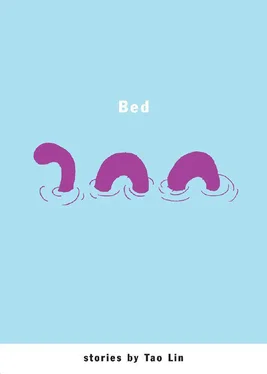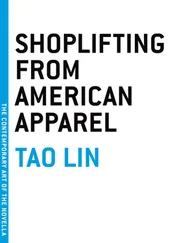Tao Lin - Bed
Здесь есть возможность читать онлайн «Tao Lin - Bed» весь текст электронной книги совершенно бесплатно (целиком полную версию без сокращений). В некоторых случаях можно слушать аудио, скачать через торрент в формате fb2 и присутствует краткое содержание. Год выпуска: 2007, Издательство: Melville House Publishing, Жанр: Современная проза, на английском языке. Описание произведения, (предисловие) а так же отзывы посетителей доступны на портале библиотеки ЛибКат.
- Название:Bed
- Автор:
- Издательство:Melville House Publishing
- Жанр:
- Год:2007
- ISBN:нет данных
- Рейтинг книги:5 / 5. Голосов: 1
-
Избранное:Добавить в избранное
- Отзывы:
-
Ваша оценка:
- 100
- 1
- 2
- 3
- 4
- 5
Bed: краткое содержание, описание и аннотация
Предлагаем к чтению аннотацию, описание, краткое содержание или предисловие (зависит от того, что написал сам автор книги «Bed»). Если вы не нашли необходимую информацию о книге — напишите в комментариях, мы постараемся отыскать её.
Bed — читать онлайн бесплатно полную книгу (весь текст) целиком
Ниже представлен текст книги, разбитый по страницам. Система сохранения места последней прочитанной страницы, позволяет с удобством читать онлайн бесплатно книгу «Bed», без необходимости каждый раз заново искать на чём Вы остановились. Поставьте закладку, и сможете в любой момент перейти на страницу, на которой закончили чтение.
Интервал:
Закладка:
Colin had been thinking about the week after September 11th, had been thinking about that for a long time — but wasn’t anymore. He wasn’t thinking anything anymore. He was the effect of some inception. There was the first thing, and then so on, all the rest being effect, and there was nothing Colin could do about that. If he was going to feel this way, then he was going to feel this way. Feelings were a part of the effect too. The effect was everything, and forever. It couldn’t be changed or gotten out of.
But Colin wasn’t thinking or feeling any of this, really.
It was all just there, in him — what he’d think or feel if he were to. It was a leaf, waiting for him. His heart was a leaf. A white leaf, inside a gigantic noise.
September 11th, that Tuesday, Colin had called Dana’s room and left a message. He called again the next day and left another. It was the second week of college and Colin didn’t know anyone. He spent that week lying awake in his room, listening to music, not eating barely anything. Mostly just thinking about Dana. Waiting for her call.
By Friday, Colin had convinced himself that Dana hadn’t called because she had left the city; a lot of people had — his roommate had. Though, really, he wasn’t sure, as he’d been thinking about when they last hung out. It had been different than the times before. They hadn’t had fun really — not nearly as much as at first — and hadn’t made plans. But then maybe she had just left the city.
It wasn’t until a few months later — after Dana met her boyfriend — that Colin found out she had been across Washington Square Park all that week; she hadn’t left, hadn’t called.
But that was later.
On Friday, Colin could still feel a little less lonely thinking about Dana.
That night they were showing movies for free at Union Square, and Colin went. There were many homeless people, all of them alone. No one wanted to sit by a homeless person — with their puffy, Godless coats; their animal largeness — but then every seat filled, and some people had to. Colin was a little dazed, watching this, and had stopped, for a time, feeling sorry for himself, but for everyone else — everything. The movie was very independent and very sad. Outside, the streets were closed to cars. People walked on them. Missing-person flyers were taped over ads and poles. It was very quiet without any cars. Colin felt vast and detailless and disembodied; it was the same tired and endless feeling everywhere, he felt, inside of him and out — in the stung and ashen air, the buildings tall and pale as apparitions, the strange and lowered sky. Colin didn’t want to go back to his room. He walked around for a very long time, looking down at the sidewalks and streets, and thought of the things he and Dana might say to each other if she were with him. And every once in a while he would catch himself smiling and laughing a little, and it was those moments right after — as, having lapsed into fantasy, there was a correction, a moment of nothing and then a loose and sudden rush, back into the real world in a trick of escape, as if to some new place of possibilities — that he felt at once, and with clarity, most exhilarated, appreciative, disappointed, and accepting.
Nine, Ten
People got a bit careless that year. Band-aids were forgone, small wounds allowed to go a little out of control — to infect a bit. Jobs were quit. People woke early-evening or mid-afternoon, fisted ice cream bars, wandered from their homes — only a little bit depressed — and walked diagonally through parking lots. They felt no longer in the midst of things, but in the misty aftermath of things, the quaint and narcotic haze of what comes after. A haze in which nothing, they knew, could ever fully, truly, happen. Anything there was could only yearn for itself, at a distance, behind barricades, could only long for the real self of itself. The core of things — of love and life, of any simple feeling or thought — could no longer be experienced center-on, could no longer be thought of or felt directly, but only in trying, in tics and glimpses, in ways holographic and fleeing.
And so people stayed inside mostly. Some disappeared. Others called up their local papers, phoned in their own deaths and, next day, read their own obituaries with a strange, hollow sort of longing, a real but feeble passion for their alternate, dead selves. They sat nights in bathtubs, whistling, blow-drying their hair— taking that risk . They began exploring their own houses. Moving things around and touching stuff, as they had begun to sense that there was something with them, unseen and poignant, something slightly alive and, they suspected, relevant, inside the walls or behind the furniture, a thing cloaked and shadowy that approached, in angles, and then vanished— their own lives , they came to realize. It was their own lives, living with them, playing games, tag and hide-and-seek, and — having hid somewhere good, somewhere unfindable , years ago probably — stubborn, wanting to be found, needing that resolution, but just rotting there, then, in whatever godforsaken hiding spot, like some mean, oversweet piece of fruit, spurned, finally, to a crisp — an apple chip.
In the oceans, sea life grew bold. Sharks leapt into boats, snarling, leapt out. Tuna fish matured to the size of small whales, and packs of seals moved inland, taking the back roads. All along the coasts were suicides, rare and wintry specimens — narwhal, whale sharks, oarfish — beaching themselves, rolling up far (too far , people said), sliding onto the grassier sands, scooting up against the beachfront hotels, the Slurpy huts.
At Cocoa Beach, there was the oversized squid. It was early summer and Florida, and the squid washed smoothly ashore — forty-feet long and pink-flecked — in one extra-foamy wave.
“Architeuthis dux,” people said. “The giant squid.” They were knowledgeable. They had their patterned towels, their wine coolers, and they moved down the beach in a migratory trudge. “First the toe thing, the dog thing,” said one woman, looking around, “last week the toaster, after that the cow, then the ticks, the little apocalypse, the parking lot with the political skater punks, now this squid thing, this squid … thing.”
Her face had gotten red and she lightly slapped it a few times, after which she looked a little better — mollified.
Jed, his dad, and his friend LJ were there. LJ was a girl and she and Jed were nine.
“That’s interesting,” Jed’s dad said. But he wouldn’t look at it— the squid . The three of them had a beach ball, were kicking it, and Jed’s dad just kept kicking. He didn’t know if he was ready for something like that, a thing of such size and agony. He might get obsessed — he was prone to — and also he had lately been practicing, earnestly, a kind of halfhearted Buddhism, with timeouts and the occasional off-day. He was to destroy almost all desires. He wasn’t ready yet to destroy all desires. It scared him, actually, the idea of having no desires — as that in itself was a desire. Or was it? He didn’t know, that was the thing. He was unemployed.
“Why don’t we look at it from closer?” Jed said quietly. He would go himself, but it could be a trick — Venus flytrap or something. He didn’t want to be mauled, not like some deer.
They kept kicking the beach ball.
Between kicks they had to stand there and wait, as the ball, once in the air, seemed to slow down, to take its time up there, enjoying the view.
The sky was blue until you looked into it, then you saw it was more of a lightly polluted gray.
“It’s just a giant squid,” LJ said after a while, having zoned out for some time. She now could see it looming, burrito-y and soulless, in her periphery. “It’s just a giant squid,” she said again. She kicked the ball, and then felt stupid. It’s just a giant squid . What did she mean? She was just a little girl, she knew. “Wait,” she whispered. She blushed. A wind came at her face and she had to blink a few times. A wave came, took back the squid, and deposited in its place a clump of dead jellyfish — the squashed, opaque bags of them like mangled eyes, flayed and beaten, swollen to the size of heads.
Читать дальшеИнтервал:
Закладка:
Похожие книги на «Bed»
Представляем Вашему вниманию похожие книги на «Bed» списком для выбора. Мы отобрали схожую по названию и смыслу литературу в надежде предоставить читателям больше вариантов отыскать новые, интересные, ещё непрочитанные произведения.
Обсуждение, отзывы о книге «Bed» и просто собственные мнения читателей. Оставьте ваши комментарии, напишите, что Вы думаете о произведении, его смысле или главных героях. Укажите что конкретно понравилось, а что нет, и почему Вы так считаете.












